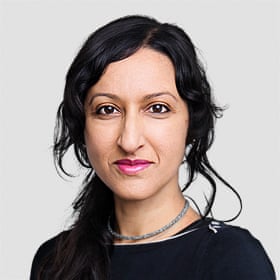Baghdaddy review – arresting and absurd take on war’s trauma
Royal Court, London
A British Iraqi and her father re-enact his wartime memories under the direction of three ghoulish clowns in a daring if uneven debut
Royal Court, London
A British Iraqi and her father re-enact his wartime memories under the direction of three ghoulish clowns in a daring if uneven debut
There are searing moments in this tale of a father and daughter whose relationship is shaped – or misshaped – by the trauma of war, yet they come in an uneven debut play which uses absurdism and clowning in a flamboyant way. Its punches can hold us breathless but there are too many baggy or blunt scenes whose dark humour is neither funny nor dangerous enough.
Written by Jasmine Naziha Jones who also plays the part of the British Iraqi daughter, Darlee, opposite Philip Arditti as her father, it takes us through the Iran/Iraq war of 1980-88, the Gulf war of 1990-1 and the 2003-11 Iraq war by enacting his memories of them.

Under the direction of Milli Bhatia, we enter a hallucinatory world in which Darlee falls into the rabbit hole of her father’s past. Alongside them is a trio of otherworldly clowns – played by Noof Ousellam, Hayat Kamille and Souad Faress – who control the story. Father and daughter become their puppets in a nightmarish alternate reality where they are forced to enact harrowing memories.
The notion of exploring difficult subject matter through clowning is original yet feels contrived here. As they switch from manipulators of the action to commentators on it, these figures gurn and overact but we do not feel the horror or laughter we should.
The first half feels imbalanced by skit-like scenes of the father’s early years in Britain. We lose sight of Darlee for part of the play, though Arditti’s performance is superb and he quietly commands the stage. The second half is darker with surreal violence orchestrated by the clowns alongside slow-motion scenes, snaps of tinny pop songs, flashes of light, all tossed out with plenty of effect but not enough meaning.
The stage looks slightly too big for Moi Tran’s witty, spare set design although there is a fierce use of lighting (by Jessica Hung Han Yun) and sound (by Elena Peña) which fills the space with blasts, whispers, spotlights and blackness.
It ends with two potent monologues which swing away from the logic of a nightmare, speaking about war directly. While Baghdaddy’s complicated parts do not quite come together, its boldness is extraordinary and certainly showcases the playwright’s fearless talent.
 ?width=300&quality=85&auto=format&fit=max&s=794af043e6aaa3ca4812a9bbe89105c2"},{"id":"tracking/commissioningdesk/uk-culture","type":"Tracking","title":"UK Culture"}]}" clientonly="true"/>
?width=300&quality=85&auto=format&fit=max&s=794af043e6aaa3ca4812a9bbe89105c2"},{"id":"tracking/commissioningdesk/uk-culture","type":"Tracking","title":"UK Culture"}]}" clientonly="true"/>